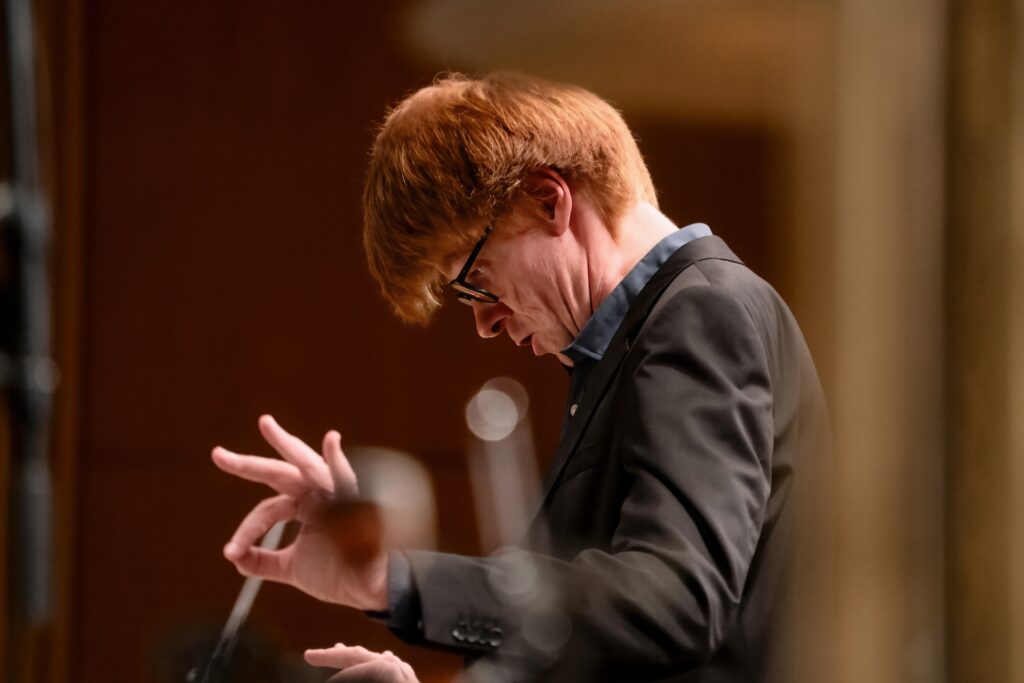Ensemble Musikfabrik & Enno Poppe: Prozession
Sat 15.2.2025 19
Sibelius Academy’s concert hall
Performers:
Ensemble Musikfabrik
Enno Poppe, conductor
Programme:
Enno Poppe (*1969): Prozession
Enno Poppe lives in Berlin and is one of Germany’s leading composers of new music. He is, in his own words, engaged in a constant search for the new, and his broad-minded but meticulous craftsmanship has brought him numerous accolades both in Germany and abroad. Since making his debut with the ensemble mosaic in 1998, he has also won recognition as a conductor, regularly collaborating with countless eminent contemporary music ensembles. In 2019, he visited Musica nova Helsinki as the spirited conductor of the Ensemble Intercontemporain from France.
Prozession (2015 / 2020) was commissioned jointly by the Kunststiftung NRW, Musikfabrik, the Estonian AFEKT International Contemporary Music Festival and the Berlin artist couple Bernd and Ute Bohmeier. The final version took shape during the quiet Covid years, when Poppe revived a work he had already been planning in 2015. He originally had designs for a piece about fifteen minutes long divided into nine sections and nine sub-sections. Creative freedom nevertheless, he reports, took precedence over architecture, and Prozession expanded of its own accord, spreading beyond the outlines of the ground plan. It was premiered without an audience in 2020, streamed from the Cologne Philharmonie Hall, but has since received regular and highly-acclaimed performances to live audiences.
The titles of Poppe’s works often lend themselves to many interpretations: “Prozession” may, for example, allude to the processions of the Catholic Semana Santa in Seville, in which trumpets and drums accompany the Holy Week processions of figures carried aloft by members of the Hermandades religious brotherhoods. Then again, the work’s microtonal process (“Prozess”) takes place at an abstract ceremonial level in Poppe’s hands, towards a target set by the participants.Prozession falls into nine virtuoso instrumental duets: flute–violin, horn–organ, oboe–viola, trombone–electric guitar, alto saxophone–cello, trumpets, double bass clarinet–double bass, first violin–other strings, and keyboards. Four percussionists placed symmetrically on the concert platform act as the driving force behind the music, their function being dramaturgical rather than to create a marching effect in the stream of quirky time changes. The chorale-like tutti marking the borders of the duos create a religious or at least introspective impression. As Poppe puts it: “A state is achieved about which I know little and wish to say only little; a state that extends beyond the music, brings time to a halt. The music itself does this.” Poppe has called large-scale ensemble works contemporary symphonies, and in Prozession he sheds light on his essayistic view of the genre’s potential.
Ensemble Musikfabrik
Since its foundation in 1990, Ensemble Musikfabrik (Landesensemble NRW) has had the reputation of being one of the leading ensembles for contemporary music. In keeping with the literal meaning of its name, Ensemble Musikfabrik is particularly concerned with commissioning and producing new works, often in close collaboration with composers. The results of their extensive endeavors are performed by the international Cologne-based soloist ensemble in numerous concerts in Germany and abroad, at festivals, in the self-organized concert series “Musikfabrik im WDR” and “Montagskonzerte” (often with live broadcasts), and in audio and video productions. WERGO released the CD series “Edition Musikfabrik” with cover art by Gerhard Richter, who chose the paintings for the CDs himself. In 2014, the in-house Label Musikfabrik was founded.
Exploring forms of modern communication and new possibilities for expression in music and theatre are a focal point. Interdisciplinary projects that include live electronics, dance, theatre, live video, and visual art expand the conventional form of the conducted ensemble concert. Thanks to its extraordinary profile and its superb artistic quality, the Ensemble Musikfabrik is sought after worldwide and is a trusted partner of renowned composers and conductors.
Enno Poppe
Enno Poppe, born in 1969, is one of the most important composers of new music in Germany. Poppe studied conducting and composition at the Berlin University of the Arts, under Friedrich Goldmann and Gösta Neuwirth, among others. In addition to scholarships – including from the Akademie Schloss Solitude and the Villa Serpentara in Olevano Romano – he received the Boris Blacher Prize in 1998, the Composition Prize of the City of Stuttgart in 2000, the Busoni Composition Prize of the Berlin Academy of Arts in 2002, the Ernst von Siemens Music Foundation’s 2004 Promotion Prize, the Schneider-Schott Prize in 2005, the Kaske Foundation Prize in 2009 and the Hans and Gertrud Zender Foundation Prize in 2011. He is a member of the Berlin Academy of Arts, the Academy of Sciences and Arts in Düsseldorf and the Bavarian Academy of Fine Arts in Munich. His works are performed by almost all well-known ensembles worldwide and at most festivals for new music. Enno Poppe has lived and worked in Berlin since 1990. He works as a conductor with numerous ensembles for new music such as the Ensemble Musikfabrik, Ensemble Modern, Klangforum Wien, ensemble resonanz and Ensemble Intercontemporain. He has been the conductor of the ensemble mosaik since 1998.

Musicians
Enno Poppe, conductor
Helen Bledsoe, flute
Peter Veale, oboe
Carl Rosman, clarinet
Patrick Stadler, saxophone
Christine Chapman, horn
Marco Blaauw, trumpet
Lucy Humphris, trumpet
Stephen Menotti, trombone
Benjamin Kobler, e-organ
Ernst Surberg, e-organ
Yaron Deutsch, e-guitar
Dirk Rothbrust, percussion
Thomas Meixner, percussion
Rie Watanabe, percussion
Ramón Gardella, percussion
Hannah Weirich, violin
Tinta Schmidt von Altenstadt, violin
Axel Porath, viola
Dirk Wietheger, violoncello
Florentin Ginot, double bass
Supported by:
Jane and Aatos Erkko Foundation
